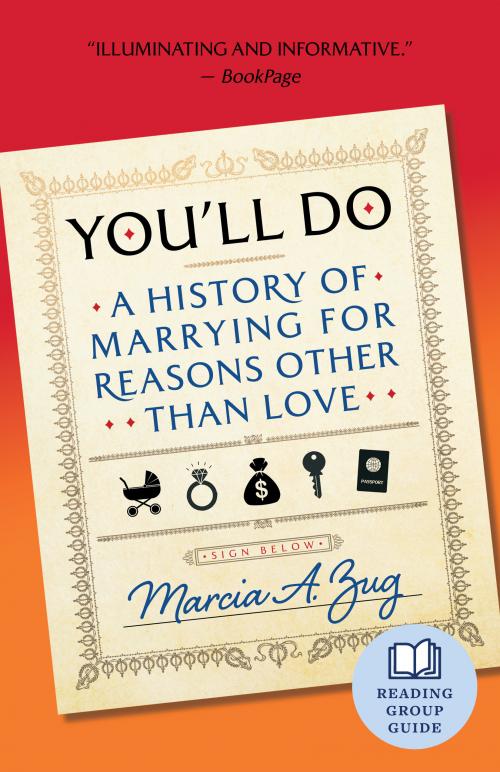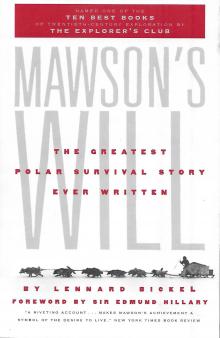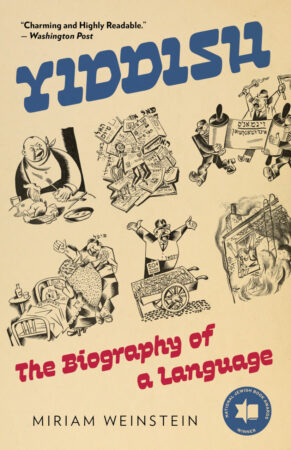Excerpt
Introduction
If you ask Americans why they married, almost everyone will say “love.” Love is the only publicly acceptable reason to marry, but it is far from the only one. Despite romantic notions about love and marriage, marriage is fundamentally a legal institution. It is a way to confer valuable rights and benefits, and sometimes it is the only way to receive these rewards. A vast misconception about modern marriage is, as the nursery rhyme states, that love comes first. This isn’t always true. Sometimes love comes later. Sometimes it doesn’t come at all, and legally, love is irrelevant.
You’ll Do was inspired by the marriage of my great-aunt Rosie, a brave woman who didn’t marry for love. In the late 1930s, Rosie was working in a garment factory on Manhattan’s Lower East Side. Like most of the workers, Rosie was Jewish. Her best friend in the factory was also Jewish, and both understood the dangers posed by the rise of fascism in Europe. Rosie and her friend were safe, but her friend’s brother, Sol, was not. Sol lived in Poland and, as the Nazis rose to power, Sol’s family began to fear for his life. They desperately sought to bring him to America, but the US’s draconian immigration restrictions severely limited the immigration of “undesirable” groups, such as Jews. Sol was stuck. America would never grant his immigration application, with one exception — marriage. The only way to get Sol out of Poland, and save his life, was to marry him. So that’s what Rosie did. In late 1937, as Nazi Germany was preparing for war, Rosie left the safety of America to marry a man she had never met and save his life.
Sol entered the United States in September 1938. He moved in with Rosie; they had a daughter and fell in love. Rosie and Sol’s story has a happy ending, yet it’s a tale that haunts me. If Rosie hadn’t married Sol, he almost certainly would have died in a Nazi concentration camp. Marriage saved his life, but only because a racist US immigration law denied him entry in the first place. You’ll Do is full of similar stories. Stories that show how generations of American men and women have used marriage as a loophole to circumvent unfair or discriminatory laws. Unfortunately, not all these marriage stories are as admira- ble as Rosie’s. You’ll Do reveals how the rights and benefits that attach to marriage can also perpetuate harms. My family has a second, darker marriage story that falls into this category.
Many years ago, one of my relatives lived with his wife and daughter. The daughter was mentally disabled (it may have been a birth injury), and after her birth, the couple was unable to have more children. This caused them great sorrow, and when their daughter was grown, they paid a man to marry her and provide them with a grandchild. The marriage took place nearly a century ago, and the daughter’s capacity to consent does not appear to have been an issue. The two were legally married, and shortly thereafter, the daughter fell pregnant. Then, having fulfilled the terms of the bargain, the husband disappeared. Nine months later, the daughter gave birth to a healthy baby.
This second story is about marrying for money, but it is also about marrying for parenthood and for criminal and legal protec- tions. Marriage provided the husband with money while also protecting him from criminal prosecution for rape; there really isn’t any other way to describe it. In addition, marriage gave the grandparents their longed-for second child and protected the child from the legal “taint” of bastardy.
The specifics of my family’s stories are unique. However, their instrumental use of marriage is not. I have a neighbor who married to lower his university tuition, two friends who married for tax breaks, and a colleague who married for a green card. These four are just the ones who have told me about their non-love reasons for marrying. Presumably, I know many others. Chances are, you do as well. Perhaps a non-love reason even motivated your own marriage.
Historically, marrying for love was considered a gamble. A popular story from a 1791 issue of the Virginia Gazette and Alexandria Advertiser illustrates this pessimistic view. The story describes a beleaguered clergyman who was enduring a “curtain-lecture” (meaning a scolding) from his wife when they were interrupted by a young couple requesting a marriage ceremony. According to the article, “The poor Priest, actuated at that moment to his own feelings and particular experience,” mistakenly began “repeating the burial Service.” The “astonished Bridegroom” then pointed out the error, to which the clergy- man replied, “I am obliged to marry you — but, believe me, my friend, you had better be buried.”1 Between 1791 and 1823, this “anecdote” was printed more than sixty times.
Marrying for love was risky, and for centuries, many Americans believed marrying for the legal, social, and economic benefits attached to marriage was a safer bet. Blatantly transac- tional marriages were permissible and even admired. In 1821, the Louisiana Gazette printed a story of a young man who hedged his marital bets by auctioning himself off in a lottery. Described as “of a good figure and disposition,” the man offered six hundred tickets for $50 each to single women interested in marriage. The winner was then “entitled to himself and the 30,000 dollars.” The paper described the scheme as “ingenious” and expressed confidence that “matches formed this way” would “prov[e] as happy as those made in the usual manner.”
Eventually, acceptance of transactional marriage had largely disappeared. By the late nineteenth century, the non-love match was viewed as threatening.The 1888 Supreme Court case Maynard v. Hill exemplified this change. In Maynard, the court described marriage as “an institution, in the maintenance of which in its purity the public is deeply interested, for it is the foundation of the family and of society, without which there could be neither civilization nor progress.” Today, a century and a half later, such sentiments remain widespread. However, whether the Maynard court’s fears were justified is a more complicated question.
Economists have long claimed that everything is already commodified, that such commodification is good, and that attempts to prevent the sale of certain goods and services are bad. Conversely, anti-commodificationists argue that viewing everything in market terms is detrimental and that such treat- ment coarsens and corrupts our world. Both views are likely correct. Feminist scholar Margaret Radin has dubbed this the double-bind problem and suggests that the best way to counter- act it is to identify the underlying causes.
You’ll Do examines the marriage double bind. It shows how the instrumental use of marriage can be beneficial, helping to combat racial, gender, and class discrimination, and how this calculated use of marriage can also further such oppression. Additionally, the book challenges the assumption that non-love marriages are problematic because love is the purpose of marriage. Since America’s founding, marriage has primarily been a rights distribution mechanism. This remains the principal purpose of marriage, but that doesn’t mean it should be. Marriage is an imprecise and unfair method for determining the allocation of rights and benefits. Decoupling these rewards from marriage would alleviate this unfairness. It would also, truly, make love the purpose of marriage. It might also make marriage obsolete.
You’ll Do is divided into six chapters. Chapter 1 focuses on the best-known marital bargain — marrying for money. It traces the long history of “gold-digging” marriages and shows that marrying for money, especially by women, was expected and encouraged. Chapter 2 examines marrying for govern- ment benefits and highlights the government’s extensive role in encouraging instrumental marriages. Chapter 3 explores the connection between marriage and status. It shows that married Americans have historically occupied a higher and more power- ful status than the unmarried and that this connection contin- ues to motivate modern marital decisions. Chapter 4 details the long-standing, but less well-known, criminal benefits that attach to marriage. Chapter 5 discusses the connection between marriage and parental rights, and chapter 6 returns to the issue of marrying for money, but with a focus on the present day.
You’ll Do covers the most common non-love reasons people marry, with one significant exception — religion. In many reli- gions, marriage is both a sacrament and a commandment. This can be a powerful non-love motivation for marriage. However, I have excluded religious marriage from You’ll Do because the book’s focus is on the connection between law and marital decision making. Religious marriages, if they comply with state marriage laws, receive the same legal benefits as all other marriages, but they are not motivated by these benefits. Spouses in religious unions would marry regardless of governmen- tal recognition. Mormon polygamous marriages are one well- known example.
You’ll Do is about the non-love reasons people marry, but even in these unions, love may be present. Marriage is complex, and people can marry for a combination of reasons. A person might decide to marry for immigration benefits, but only after also falling in love with their potential spouse; conversely, they might have loved their partner for many years, but only married when they decided to have a child. The purpose of this book is not to deny this complexity. Rather, You’ll Do seeks to explore the consequences of a marital regime that insists love is the only acceptable reason to marry while enacting laws and policies that give Americans so many non-love reasons to wed.





